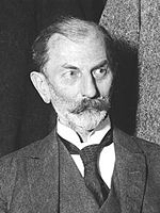
Rudolf E. A. Havenstein
Encyclopedia
Rudolf E. A. Havenstein was a German
lawyer and president of the Reichsbank
(German central bank) during the hyperinflation of 1921-1923.
Havenstein was born in Meseritz (Międzyrzecz)
, Province of Posen
. He came from a family of government officials and studied law in Heidelberg and Berlin
. After graduation in 1876, Havenstein worked in the Prussian Justice service until 1887 when he began his career as a judge. In 1890 he moved to the Prussian Ministry of Finance. From 1900 to 1908, Havenstein was President of the Prussian State Bank. From 1908 to 1923, he was president of the Reichsbank
and his signature appears on German Reichsbank notes from 1908 to 1923.
Havenstein was involved in the introduction of war bond
s at the beginning of the First World War.
He died in Berlin and is buried in St. Anne's Cemetery in Berlin-Dahlem.
Germany
Germany , officially the Federal Republic of Germany , is a federal parliamentary republic in Europe. The country consists of 16 states while the capital and largest city is Berlin. Germany covers an area of 357,021 km2 and has a largely temperate seasonal climate...
lawyer and president of the Reichsbank
Reichsbank
The Reichsbank was the central bank of Germany from 1876 until 1945. It was founded on 1 January 1876 . The Reichsbank was a privately owned central bank of Prussia, under close control by the Reich government. Its first president was Hermann von Dechend...
(German central bank) during the hyperinflation of 1921-1923.
Havenstein was born in Meseritz (Międzyrzecz)
Miedzyrzecz
Międzyrzecz is a town in western Poland with 18,584 inhabitants . The capital of Międzyrzecz County, it was part of the Gorzów Wielkopolski Voivodeship from 1975–1998. Since the Local Government Reorganization Act of 1998, Międzyrzecz has been situated in the Lubusz Voivodeship...
, Province of Posen
Province of Posen
The Province of Posen was a province of Prussia from 1848–1918 and as such part of the German Empire from 1871 to 1918. The area was about 29,000 km2....
. He came from a family of government officials and studied law in Heidelberg and Berlin
Humboldt University of Berlin
The Humboldt University of Berlin is Berlin's oldest university, founded in 1810 as the University of Berlin by the liberal Prussian educational reformer and linguist Wilhelm von Humboldt, whose university model has strongly influenced other European and Western universities...
. After graduation in 1876, Havenstein worked in the Prussian Justice service until 1887 when he began his career as a judge. In 1890 he moved to the Prussian Ministry of Finance. From 1900 to 1908, Havenstein was President of the Prussian State Bank. From 1908 to 1923, he was president of the Reichsbank
Reichsbank
The Reichsbank was the central bank of Germany from 1876 until 1945. It was founded on 1 January 1876 . The Reichsbank was a privately owned central bank of Prussia, under close control by the Reich government. Its first president was Hermann von Dechend...
and his signature appears on German Reichsbank notes from 1908 to 1923.
Havenstein was involved in the introduction of war bond
War bond
War bonds are debt securities issued by a government for the purpose of financing military operations during times of war. War bonds generate capital for the government and make civilians feel involved in their national militaries...
s at the beginning of the First World War.
He died in Berlin and is buried in St. Anne's Cemetery in Berlin-Dahlem.
See also
- Karl HelfferichKarl HelfferichKarl Theodor Helfferich was a German politician, economist, and financier from Neustadt an der Weinstraße in the Palatinate.-Biography:...
- Andreas HermesAndreas HermesAndreas Hermes was a German Christian Democratic Union politician, agricultural scientist, Finance Minister of the Weimar Republic, and a member of the resistance to Nazism.- Life :...
- Weimar RepublicWeimar RepublicThe Weimar Republic is the name given by historians to the parliamentary republic established in 1919 in Germany to replace the imperial form of government...
- HyperinflationHyperinflationIn economics, hyperinflation is inflation that is very high or out of control. While the real values of the specific economic items generally stay the same in terms of relatively stable foreign currencies, in hyperinflationary conditions the general price level within a specific economy increases...
- Inflation in the Weimar RepublicInflation in the Weimar RepublicThe hyperinflation in the Weimar Republic was a three year period of hyperinflation in Germany between June 1921 and July 1924.- Analysis :...

